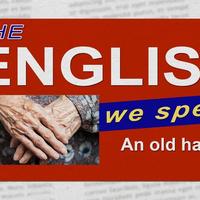An old hand: The English We Speak - YouTube
Ein alter Hase: Das Englisch, das wir sprechen - YouTube
Un veterano: El inglés que hablamos - YouTube
Un vieux routier : L'anglais que nous parlons - YouTube
Una vecchia mano: L'inglese che parliamo - YouTube
古い手:私たちが話す英語 - YouTube
오래된 손: 우리가 말하는 영어 - YouTube
Een oude rot: Het Engels dat wij spreken - YouTube
Uma mão velha: O inglês que falamos - YouTube
Старая рука: Английский, на котором мы говорим - YouTube
Eski bir el: Konuştuğumuz İngilizce - YouTube
Стара рука: Англійська, якою ми говоримо - YouTube
老手:我们说的英语 - YouTube
老手:我們說的英語 - YouTube
Feifei: Hello and welcome to The English We
Speak. I'm Feifei.
Neil: And I'm Neil. Hey Feifei, shouldn't
ニール:そして僕はニールだ。ねえ、フェイフェイ。
we be celebrating?
||축하하고 있니?
私たちは祝うべきなのだろうか?
Feifei: Why?
Neil: Haven't we presented a hundred of these
|||제공한||백||
|não||||||
ニール:私たちはこのようなものを100回も発表したことがある。
The English We Speak
programmes together?
Programme zusammen?
programas em conjunto?
Feifei: A hundred? Oh no, we've done way more
Feifei: Hundert? Oh nein, wir haben schon viel mehr gemacht.
Feifei : Une centaine ? Oh non, nous en avons fait bien plus
菲菲:100回?いえいえ、もっとたくさんやっていますよ
Feifei: Cem? Oh não, já fizemos muito mais
菲菲:一百?哦不,我們已經做了更多
than that. I could
als das. Ich könnte
present these programmes
diese Programme vorlegen
présenter ces programmes
apresentar estes programas
презентують ці програми
介紹這些程序
standing on my head!
auf meinem Kopf stehen!
debout sur ma tête !
de pé na minha cabeça!
стоїть на моїй голові!
站在我的頭上!
Neil: That I would love to see!
Neil : J'aimerais bien voir ça !
Neil: Isso é que eu gostava de ver!
Ніл: Це я б із задоволенням подивився!
Feifei: Not literally. I mean do it easily
Feifei : Pas littéralement. Je veux dire qu'il faut le faire facilement
Feifei: Não literalmente. Estou a falar de fazer isso facilmente
- without difficulty.
|어려움
|dificultad
Neil: I know that Feifei – but you probably
Neil : Je sais que Feifei - mais vous avez probablement
could present this programme standing on your
pourrait présenter ce programme debout sur votre
可以在您的基礎上展示這個程序
head because you're an old hand at this.
parce que vous êtes un habitué de la chose.
cabeça porque és um veterano nisto.
Feifei: Excuse me? I may have presented this
programme for many years but I do NOT have
old hands. How rude!
||como|grosseiro
Quelle impolitesse !
Neil: Don't worry, I wasn't referring to your
|||||언급하는||
hands – they look lovely. If you are an
|||adorables||||
old hand at doing something, it means you
are very skilled and experienced. It was a
||compétents|||||
são muito competentes e experientes. Foi um
compliment!
칭찬
褒める
elogio
Feifei: Oh right. Thanks. Let's hear some
examples of this phrase in action…
exemplos desta frase em ação...
Examples: Let's get Mike in to solve our IT
|||Mike (the expert)|||||
Exemples : faisons appel à Mike pour résoudre nos problèmes informatiques.
Exemplos: Vamos chamar o Mike para resolver o nosso problema informático
problem, shall we? He's an old hand
|verbo auxiliar|||||
Problem, nicht wahr? Er ist ein alter Hase
problema, vamos? Ele é um veterano
at fixing computers.
|consertar|
Miguel is an old hand at map reading, so let's
Miguel|||||||||
Miguel|||||||||
||||||lectura de mapas|||
Miguel ist ein alter Hase im Kartenlesen, also lasst uns
O Miguel é um velho conhecedor da leitura de mapas, por isso vamos
make him the leader on
fazer dele o líder em
our mountain trek.
||randonnée
||트레킹
||excursión montañosa
||nossa caminhada pela montanha
a nossa caminhada na montanha.
I can see you're an old hand at project management;
|||||||||관리
|||||||||gestión de proyectos
Ich sehe, Sie sind ein alter Hase im Projektmanagement;
あなたがプロジェクト管理の古株であることはよくわかった;
Vejo que é um veterano na gestão de projectos;
it would have taken me days to create a spreadsheet
||||||um zu erstellen|||Tabellenkalkulation erstellen
|||||||||스프레드시트
|||||||||planilha
|||||||||hoja de cálculo
スプレッドシートを作るのに何日もかかっただろう
ter-me-ia levado dias a criar uma folha de cálculo
мені знадобилося б кілька днів, щоб створити електронну таблицю
like that!
Feifei: This is The English We Speak from
Feifei: Este é o inglês que falamos de
BBC Learning English and
we're learning about
the phrase 'an old hand', which describes
||||expert person||
句 '老練な手' は、
someone who is skilled and
|||compétent|
|||geschickt|
熟練し、
experienced at
erfahren in|
経験豊富な人を表します
doing something.
Neil: It's a handy phrase, isn't it! But come
|||pratique|||||
|Es ist|||||||
|||유용한|||||
Neil: É uma frase muito útil, não é? Mas vamos lá
on Feifei, as you are such 'an old hand',
sobre o Feifei, já que és "um veterano",
why not have a go at really presenting
por que|||||||
pourquoi ne pas essayer de présenter réellement
porque não tentar apresentar de facto
standing on your head?
de cabeça para baixo?
Feifei: OK Neil, as you're paying me a
|||||지불하는||
Feifei: OK Neil, da du mir einen
フェイフェイ:ニール:わかりました。
Feifei: OK Neil, já que me estás a pagar um
compliment. Here goes… give a hand…
Kompliment. Los geht's... hilf mir mal...
compliment. C'est parti... donnez un coup de main...
elogio. Aqui vai... dá uma mãozinha...
Feifei: Ouch!
|Ai
Neil: Are you OK? I think you should stick
||||||||머물다
Neil: 大丈夫ですか?私は、あなたが留まるべきだと思います。
Neil: Estás bem? Acho que devias ficar
З тобою все гаразд? Думаю, тобі краще триматися
to doing what you are most
toward|||||
|||||가장
para fazer o que mais gosta
робити те, що тобі найбільше до душі
skilled and experienced at.
compétent|||
кваліфіковані та досвідчені в...
Feifei: You mean not listening to
Feifei: Quer dizer, não ouvir
your silly suggestions.
||제안
|tontas|
|ridículas|
as vossas sugestões idiotas.
Neil: I'm an old hand at
making silly suggestions, Feifei!
|||Feifei
|ridículas||
Feifei: Hmmm, let's forget our celebration
Feifei: Hmmm, vamos esquecer a nossa celebração
shall we? Bye!
Vamos? Adeus!
Ходімо? Бувай!
Neil: Bye.
Neil: Adeus.

